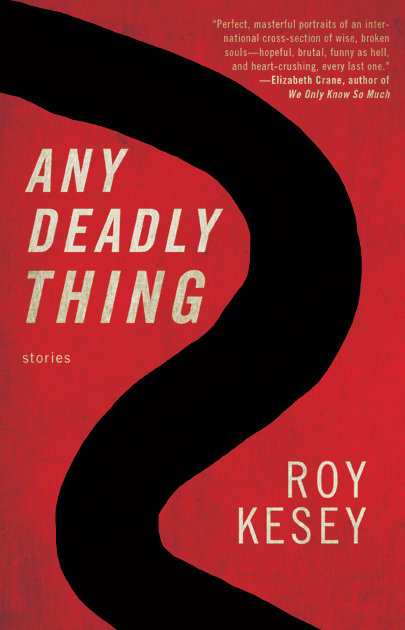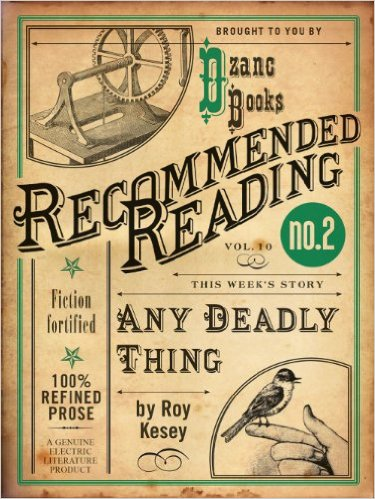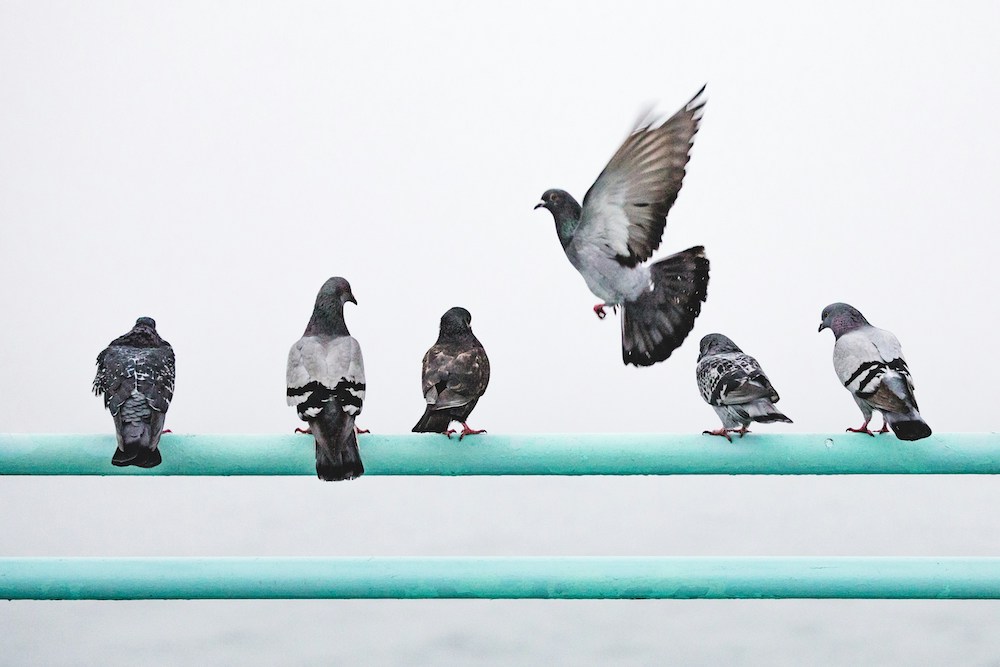Lit Mags
Any Deadly Thing
by Roy Kesey, recommended by Dzanc Books

EDITOR’S NOTE by Dan Wickett
When Steve Gillis and I formed Dzanc Books and put out an open call for submissions, we also thought about the many literary journals that we loved and greatly respected. We asked around a dozen editors of those journals if they knew any authors who were shopping books and running into the long-standing “editors love it, marketers aren’t sure how to sell it” problem. Aaron Burch of Hobart suggested Roy Kesey. Steve and I had recently read a few of his stories and been struck by the range; it seemed he used a different form for each one.

The first title Dzanc published, in October 2007, was Roy Kesey’s All Over, an amazing collection of 19 stories that finds Roy trying many different voices and styles. One is told in short sections from differing points of view; another is told in fifty-seven responses to job interview questions; another all in dialogue. Suffice to say, the title is an accurate one. Another story, “Wait,” an absurdist tale about a group of people delayed in an airport due to a thick fog, was included in Best American Short Stories 2007.
“Any Deadly Thing” is the title story of what will be the fourth work by Roy Kesey that we’ve had the pleasure of publishing: alongside that earlier collection, All Over; Pacazo, a novel; as well as his award-winning novella, Nothing in the World. “Any Deadly Thing” shows off much of what Roy does so well — seamlessly blending storylines, dipping into somewhat odd, yet not completely unheard of scenarios (in this case, churches and snakes), and doing so with a constant layering of information.
Near the end of the story, Jay has been injured, falling from the roof he was putting up for the church, a piece of rebar puncturing his stomach during the fall: “Around him are other men with snakes and they lift them and shout and pray, the snakes knotting up and then loosening, going still, the music rises and spins and something releases, the music drops off and the dancing stops, nothing now but quiet and the smell of sweat.” Here, as in all of his writing, there’s a sort of swirling of information, a marriage of pragmatism and poetry, a pulling forward of the reader bit by bit. It’s a story I’ve read close to a dozen times and I find something new to enjoy and admire every time out.
Dan Wickett
Executive Director, Dzanc Books
Any Deadly Thing
Roy Kesey
Share article
HE TELLS HIS DAUGHTER TO BE STILL, works across the back as straight as he can, almost has it but she’s whining the way she does, whining and crying, almost six and still no whole words and it grinds all up in his brain and never stops. He asks her to quiet down, tells her, he shouts and she screams. One last cut nowhere near square and he throws the scissors in the sink, grabs her then slows, thinks maybe there’s still time. He bends down but she bites him on the wrist and runs.
He sweeps up a little, lopes to the porch with what’s left of a bottle of Beam. Sits down, rubs some on the bite. He could have sold her if they were in Africa or wherever that is. A two-headed rattlesnake once, he remembers that — some zoo, or else maybe a field trip. He’s been looking for one ever since, and how much would they pay, those crazy snake Christians down the road?
When the Beam is done he goes looking. The morning is cold and quiet. She isn’t in the usual places, not even under the dead tractor. Through the oaks and madrones, and the light, his hands keep staining, blue, brown, orange, and then he knows: out where he planted her mother. It’s most of a mile and there isn’t any stone but the girl has a nose for it.
No sense making the hike — she’ll come when she’s hungry. He heads back into the house, curls on the carpet, sleeps.
There’s something and he wakes and waits, hears a skittering stone. He gets up and goes to the porch and there she is on the path, perfectly still, the snake coiled and buzzing beside her. First one of the year not counting the ones from the woodpile. Maybe yesterday’s rain filled its burrow.
He grabs a shovel, closes in. It takes a couple swings and he leaves the hot writhing there on the path, tosses the head down into the manzanita. She’s blurry, shaking, hating him. They both know she doesn’t need protecting, it’s part of the way she has, but they’d damn sure bite him if they got a chance. Jay lifts her and she’s screaming again.
He drops her a little by the television, turns it on, jacks the antenna until snow stops falling through the picture. Now she’s quiet. He heads out back to the tool shed, smells oil and leather, cold metal and compost. He takes off his shirt, draws an old Barlow down soft through the map of scars on his arm, and just like that: blood of the lamb, or something worse, something he deserves.
He tapes a rag around it, puts his shirt back on. The sky’s clouding up. He walks to the porch, calls in to her that he’ll be back, gets in the truck and pulls out onto the river road.
He killed thirty-one last year. He used to skin the biggest ones and tan the hides, but never really found any use. For a while he kept all the rattles, still has a box up in the rafters somewhere, a hundred at least, maybe five years’ worth. He’s heard there’s dust inside that if it gets in your eyes will blind you, and wonders if it’s true.
There’s no saving anything now, just shovel or shotgun or stick. So far he’s never been bit, but there was once, deer hunt, climbing a bluff and he’d slipped, rolled down a shale slide into some kind of grotto and the whole fucking place started buzzing. Big nest, twenty or so, all small but they’ll kill you just the same and he’d scrambled and cranked round after round through the bolt, felt a hot white pain in his leg, dropped the gun and jumped. Once he was out of it he pulled down his pants, found the bite but it wasn’t a bite, just the one hole and too big, something lodged under the skin. He cut at it for a time. Piece of copper jacket from one of his own bullets, turned out. Stood there, sun in his eyes, blood on his hands, pants full of blood and bunched at his ankles, happy as he’d been in a while.
The river’s full, tearing at the roots of the scrub oaks along the far bank. The bite on his wrist starts to ache. He stretches the torn skin, looks back at the road too late and the dog’s already under the wheels, front, back, and he skids, nearly takes to the water. Motherfucker. Walks back. Mostly border collie but something bigger mixed in, maybe some lab, half dead or a little more. He talks to it. He picks it up and puts it in the bed, turns the truck around.
By the time he gets home and unloads the dog in the kitchen and calls to his daughter, the dog’s about all dead, but that won’t matter. Back to the truck. Into town, not as cold any more but the rain starts up, whips him as he runs into the market. He does a circle. Bread potatoes Beam is what he’s got enough for. Waiting in line at the register, though, Cranley, snake preacher, hands all twisted up and he wants to talk.
– Church needs a new roof, he says. Interested?
– Sure. Soon as the rain stops.
– What do you think it needs a new roof for?
– When the rain stops, says Jay.
– Like to have it done for Sunday.
– What’s today?
– Tuesday.
– Takes four days to shingle, maybe five. And if there’s rot —
– Shouldn’t be. Bunch of little leaks just starting. But the whole thing’s old, so….
Jay looks at him, fucking hates these people who wait too long and then need him right this minute. Cash, though.
– You get the rain to stay stopped for five days, I’ll get your roof on.
– Deal. What happened to your wrist?
Jay takes the bag, nods at the register girl, runs out to the truck. He gets home and already the dog is sitting up, licking at the air around his daughter’s face. He watches, looks. Haircut could have been worse. Dog’s got no collar but it’s clean, somebody’s for sure but nobody’s from around here close. He boils up the potatoes, fries some venison sausage, lets her feed a little to the dog. The rain stops. An okay day.
The church is just a house way up Ember Ridge. Big cross on top, half-built pump house off to one side, loose rebar piled in the grass. The front door’s open and Jay walks in.
There’s a bunch of metal chairs in the living room, and Cranley’s on a little stage up front, maybe practicing. They shake hands, head outside and ladder up, take a look at what’s there. Sun’s out, strong for early March. The plywood underneath is wet in places but solid enough.
They go into town for supplies. Cranley pays in new hundreds and Jay thinks snake-preachering must be good business but then the man asks if he can work alongside, bring the cost down a little. Jay figures Cranley can’t barely hammer with his hands like that but says he doesn’t much care, says he’d just as soon have someone to haul anyway.
They chip the edge all the way around, rip the old gutters out, and he sends Cranley to keep at the shingles higher up. The new gutters waver like saw blades as he hammers them into place, stretched reflections, Cranley crawling down to help hold when he needs it. Half a day this way and there’s no clouds and nothing to say but Cranley talks and talks, weather and basketball, livestock. Jay has no idea about any of it except weather: it rains or it doesn’t.
They stop for lunch, and Cranley asks about Jay’s daughter, says he’s heard things. Jay cuts him off.
– What are you doing here?
– What?
– I thought you snake people were out wherever, Oklahoma, somewhere.
– Tennessee, Kentucky. Other places. We started in Georgia but they didn’t much want us around. Burned down our church, even. We heard out here was easier — tried outside Sacramento, tried outside Santa Rosa, did some driving around. My wife likes the trees.
– She likes the trees in Fallash.
– That’s right.
– Think you’ll stick it out?
– Like to, if things stay quiet.
They head back up and Jay tarpapers the edge, lapping it just over the lip of new gutter. There’s maybe two hours left of light. He cuts a couple starter sets, puts the scraps aside, has Cranley hauling bundles up the ladder. He nails the first set in place, and asks the only thing he cares to know.
– What’s it like to get bit?
– Hurts like hell. You expect something different?
– So why keep at it?
Cranley sets the last bundle down and already Jay’s sorry he asked.
– You know about signs?
– Maybe.
– For everybody watching, that’s what they get. And for you who’s doing it, it’s like you empty out. That’s all. You lift the snake up and everything disappears and it’s not even you and the snake, it’s you and the snake is part of you. Then you’re gone too, and the snake, and it’s all just God.
– But if you get bit?
– You get bit and live and the pain has made you clean. You get bit and die and that means you’ve done your time.
Jay nods and shakes his head.
– I know how it sounds, says Cranley.
– No worse than most things.
– But it’s not like any other thing at all. Why don’t you come take a look?
Jay knows he won’t ever but still he says it sounds like a plan. They work until the light is gone. He asks Cranley for half in advance, and the preacher says he can maybe do thirty percent. Jay nods, takes it, packs up.
The dog is on its feet, barely. Jay puts the grocery bags in the kitchen, gets a fire started. His daughter sits on the floor and watches. She looks more like him than like her mother, but there’s enough of his wife to make him hurt.
He watches television and she walks the dog in slow shaky circles. She could probably even heal the snakes. And maybe she has, maybe that’s why there were so many last year, she got their heads back on somehow, sent them back into the brush.
He falls asleep, snaps awake, and she’s still at it with the dog, around and around.
The roof goes all right. Cranley is decent company except when he asks about the daughter, tries to get him to send her to Sunday School, says his wife will take care of her. Keeps on Jay to go too. Jay says there’s other paths, and Cranley says there sure enough are.
Then on Friday Cranley slips, catches hold of the gutter, holds on until it rips out, lands on soft grass but does his ankle bad. Two wasted hours getting the gutter straightened and nailed back on. The ankle swells like a deer left ungutted and now Cranley just limps around looking for conversation.
– There’s more to it than snakes, he says.
– That so.
– Any deadly thing, that’s what the verse says. I can drink lye, strychnine, whatever. Tried using scorpions once but they got in my clothes, had me dancing crazy, striptease.
Jay laughs, hammers shingles, thinks of women, wants a new tattoo. Bear, maybe. Something. The bite on his wrist has gotten infected, is red and warm, but the girl’s gone quieter. Having the dog around, most likely.
Late Saturday Jay says he can catch all the snakes they’ll ever need, ten bucks a pop, free delivery. Cranley says they do okay with the ones they catch on their own. Jay shrugs. The roof’s close to done but there’s more than he’ll get to tonight, and the sky is clouding up.
– Looks like your magic on the rain is wearing out, he says.
– No magic. Just got lucky.
– I’ll finish it tomorrow.
– Can’t have you hammering during the service.
– What time you start?
– Nine.
– Get here by five, have it done by then.
– Okay. Bring your kid?
– You save her soul?
– Not if it don’t need it. My wife has them playing with felt boards mostly, stories and such. Arts and crafts. Cookies. That sound okay?
– You let them mix with the snakes?
– Nobody under eighteen.
Jay doesn’t much like it but figures they can’t do any harm. He runs a hand through his hair, wishes he’d cut it even shorter. He waits, thinks Cranley will maybe give up, but the man asks again.
– All right, says Jay. All right.
Home, in through the door and the television’s on way too loud. He turns it down and she comes screaming from behind the couch. He grabs her and almost swings but the dog’s there showing its teeth. He drops her, heads for the tool shed, bleeds down the Barlow.
She doesn’t know, too young to remember, four years old when it happened, she was screaming and he’d shouted and his wife had come at him. He knocked her down. She got up and he knocked her down again, and she got up and ran. It was an hour later he heard his daughter scream from downhill, and he took his time — took his time — until he saw his wife stretched out. Then he ran too but there was no sense to it, her head broken open, blood all over the rocks.
The girl’s back at the television, won’t look up but the dog watches him, about healthy now, not growling, just watching. He cooks up string beans and rice and half a chicken, but she won’t eat. He tells her about tomorrow, and she’s listening a little. He says she’ll like it, says he promises, and lets her be.
Five o’clock and still dark and Cranley’s there waiting, his wife too, and some other woman with two kids. Come to welcome them, looks like. The kids chase the dog around inside and the women watch and Jay heads up.
A few hours later Cranley calls him down for coffee. There’s more people now, couple dozen, some he doesn’t know. The women all look alike — long hair, long dresses. The men too have a sameness, short hair, wool shirts, faces that know about work outside. He watches his daughter there with the other kids, eight or ten of them running, she says something and it almost sounds like words but it’s hard to tell. Maybe school in September, then. Maybe.
Cranley’s wife brings the coffee. Her left hand is withered so she’s been bit too but her face looks clear, big smile, good eyes. Couple people come up to say hello, shake his hand and thank him for the roof. There’s one guy though, young, big shoulders, most of the fingers gone from his right hand, stands a ways off and asks where he got the dog.
– Hit it on the river road.
– When?
– Last week sometime.
– Thought so. She’s mine.
Jay looks at the man. The man looks back.
– If you say so.
– And she doesn’t look too hit if you ask me.
That’s about enough. Jay steps forward, looks at his daughter and wishes he hadn’t. Everyone is looking at her now, and they all must have heard about her way.
– Bumped her a little is all. But my girl —
– I figured. But the dog belongs to my boy.
– He’d maybe sell her?
– Don’t think so.
His daughter’s up close, and the dog’s alongside, its fur in her fists, and it watches the man like it knows him but not too well.
– Could you ask him at least?
– I’ll ask. But you know how kids are.
Jay looks at his daughter, shrugs, and she goes tight. He nods, finishes his coffee, heads back up. He’s almost done when the rain starts and the roof goes slick. He hammers a little faster. Cranley comes out, asks how much longer.
– Ten minutes.
– Got to get started.
– Ten minutes.
Cranley stands there, watches, gets rained on the whole ten minutes, no hat or coat, just stands there getting wet. Then it’s done. Jay looks things over. Cranley waves him down. Jay hangs his hammer on his belt, takes a step and his feet go out from under him. He’s sliding fast, twists and reaches, misses the gutter, slams into the ground beside the pump house and there’s hard hot white in his gut.
Piece of fucking rebar. He fights at the air, settles back. It’s gone clear through, pokes out his stomach, pulls at him inside.
Rain on his face and Cranley’s there telling him to stay quiet, they’ll call an ambulance, get him taken care of, it’ll all be all right. Jay can barely breathe and it’s hard to tell what’s still whole. He holds the rebar. Cranley’s talking slower. There’s others, and they lift him.
He breathes as shallow as he can, closes his eyes as they carry him in and lay him on his side. It hurts but maybe not enough. There’s talk of the rebar and they leave it in place to keep the bleeding down, get a pillow under his head and they’re talking again, something, Cranley trying to get them settled and they won’t have it and nothing matters but how much it hurts.
His daughter’s scream though, he opens his eyes and he’s lying on the little stage up front, everybody else close around and she’s fighting her way toward him but the preacher’s wife catches her up, bears her off toward the back. Her screams fade a bit and it’s best this way, exactly how he wants it. The air catches and twists inside him. Music starts, tambourines, all kinds of singing and something else, dancing and hopping and spinning, and Cranley comes forward with a big cloth bag.
Voices wild, the music faster. Cranley looks at Jay, and Jay nods. Cranley opens the bag, brings out the snake, asks if he’s sure. Jay nods again, would tell them if he could, he believed as he fell and before all that and believes now, but there’s no words for it except whatever these people are saying as they jump and sway.
There’s wet coming out his mouth and he wonders if the rebar hit a lung. Cranley’s voice again, says the ambulance is coming but he needs to hold on and this will help. Jay smiles, says he knows. Cranley leans in close, sets the snake around Jay’s neck and it curls heavy around the rebar and maybe it’s not the right thing, the snake buzzes and the voices go louder and there’s something behind it, a siren maybe but he can’t quite tell. Around him are other men with snakes and they lift them and shout and pray, the snakes knotting up and then loosening, going still, the music rises and spins and something releases, the music drops off and the dancing stops, nothing now but quiet and the smell of sweat.
Jay hears his daughter again and she’s screaming or singing, no way to know, and she’ll be okay with them either way. His vision blurs, and he blinks hard. Things go mostly clear. The others talk, pray, something. The snake on his chest tightens and lifts, its skin rasping the side of his neck. The music starts again but slower, and the others are putting their snakes away, the light goes thick and bright, Cranley steps to him and reaches and Jay turns, Cranley smiles and the snake strikes, hits Jay right below the eye, snaps his head back, holds on, more heat and oh it hurts and Cranley’s pulling it away slipping it into the bag says it will all still be all right, the pain curls Jay up around the rebar and there’s lights and faces in close, his wife his daughter and hands on his shoulders his neck his face, voices and something singing and at last this yes this pain is exactly right.









